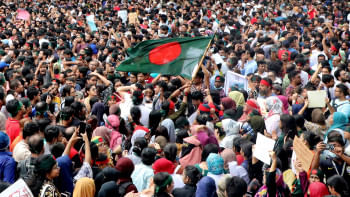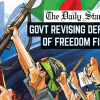Beyond the war of ideals: Bangladesh must be governed with pragmatism

With the recent victory of Donald Trump in the US presidential election, the term "culture war" has gained unprecedented prominence. In the West, the culture war refers to the ideological conflict between the liberal and progressive left and the conservative and traditional right on the political spectrum. A key trend in Western politics is the increasing reliance of politicians on culture war issues to appeal to their increasingly polarised voter bases. Naturally, the more polarised a society becomes, the more intense its culture wars grow.
Bangladesh, too, is experiencing its own culture war. Voices from the conservative right, long suppressed under the previous regime, have found space to manoeuvre and grow in influence. Bolstered by support from popular right-wing social media influencers and unprecedented access to the highest levels of government, some of these groups have rallied together and gained significant traction.
In this context, the worst thing Dr Muhammad Yunus's interim government can do is appear sympathetic to any side of this ongoing culture war. There is no possible way the government can gain anything from such pandering, as they are not bound to the demands of any voting blocks. The mandate for this government comes solely from the desire of the Bangladeshi people to bring an end to fascism and pave the way to true democracy and a just society.
Right now, a narrative is emerging that portrays the cultural left of Bangladesh—often depicted as the elite liberals of society—not only as complicit in tolerating and enabling the previous regime's brutal authoritarianism and kleptocracy, but also as active defenders of it at various points. Despite the regime's downfall, this so-called elite liberal class continues to wield considerable influence in major cultural institutions. For this reason, it is this liberal-elite class, or perhaps a caricature of this class, that is now the declared opponent of a rising political right.
In fact, with the absence of the largest centre-left political force in Bangladesh, it has become increasingly convenient to label the entire cultural left as Awami sympathisers and the "enemy of the people." This could not be further from the truth, and there were also countless independent left-leaning voices, progressive teachers and youth activists, as well as the small left-wing political entities, who were present and active on the front lines during the July uprising.
This phenomenon is not uncommon in history. The failures of centrist and leftist political coalitions, which often lead to widespread disenchantment with democracy, mirror what we witnessed during the early Bolshevik rule in the Soviet Union in the 1920s and Germany's Weimar Republic in the 1930s.
It is easy to blame an ideology or school of thought as the root cause of all evil. However, time and time again, history has shown that this is never the whole truth. The ultimate responsibility for political failings lies with the individuals in power. Rather than passing judgement solely on those who willingly or unwillingly benefited from tyranny, it is crucial to ensure that the hammer of justice falls first and foremost on the tyrant.
What Bangladesh needs right now is justice and a path to healing. The problem lies herein that justice and revenge are often impossible to distinguish.
The demand to increase military presence in the hill tracts or calls to ban entire political parties or religious institutions due to the actions of bad actors are overcorrections driven by angry mobs. These reactions, whether blind or deliberate, threaten to tear apart the increasingly fragile social fabric of Bangladesh. It is crucial to recognise that such culture war talking points are fuelled by the most radical segments of society. At present, no one can ignore the rise in vitriolic rhetoric targeting certain minority groups and Indigenous communities. This escalation has left these groups feeling frustrated and fearful, prompting some to resort to their own brand of vitriolic, populist, and anti-establishment sentiment. What is deeply concerning is that individuals carrying such radical views may now have the ear of some of the advisers.
However, I firmly believe that the majority of Bangladeshis recognise Dr Yunus as the nation's best and only choice to lead the country out of the darkness following the mass killings in July-August. His emergence at such a critical juncture in our history is nothing short of a political miracle, and it underscores the extraordinary capacity of this country to produce leaders of his calibre.
It is, therefore, our collective responsibility to protect the image and historical legacy of Dr Yunus and the interim government. A united effort is needed to keep him above the mudslinging and divisive rhetoric of the culture war. Even after his tenure as chief adviser ends, future political parties must recognise him as a national treasure—a figure who continues to represent and promote Bangladesh to the world.
This government simply cannot be allowed to fail. If it does, the forces of fascism will return with a vengeance too catastrophic to comprehend. The stakes are far too high to let that happen.
At the moment, long unresolved divisions in society are catalysing due to the machinations of subversive foreign and domestic factors. This kind of division only worsens due to rampant misinformation pushed on social media without any accountability. Moreover, well-regarded institutions of journalism are now under flak for their alleged enabling of an authoritarian government. Public trust in mainstream media in Bangladesh is already at rock bottom. There is no way journalism in this country will survive if it becomes tainted with the kind of lowbrow culture war pandering that contaminates the 24/7 news cycle of the West.
In this regard, the interim government has an important standard to set.
To succeed, it must remain above the fray of the culture war and focus squarely on its mandate. To do this, it is imperative to avoid certain critical missteps. One such misstep would be engaging in or enabling public humiliation of groups or institutions not directly linked to the previous regime. Such actions would alienate important segments of society and deepen existing divisions, creating unnecessary distractions when the focus should remain on healing and rebuilding.
Equally problematic would be to let itself get entangled in any attempt to secure symbolic victories in the culture war. These gestures might briefly appease some factions, but they serve no real purpose in governance. Worse, they risk inflaming tensions and undermining the government's ability to be seen as neutral and fair. In a time of such high polarisation, the government must rise above petty ideological battles and prioritise what truly matters.
The interim government must focus on addressing the country's urgent challenges rather than getting distracted by divisive issues. Creating jobs is vital to restoring public confidence and easing economic anxieties. High unemployment has fuelled frustration, and targeted investment in industries can provide stability and hope. Combating corruption and curbing money laundering are equally critical to restoring economic integrity. Decisive action to recover stolen funds and enforce transparency will bolster public trust.
Economic recovery also depends on stabilising prices. Rising costs of food and essentials have burdened citizens, and immediate policies to curb inflation are essential. Supporting small and medium enterprises will foster sustainable growth, ensuring recovery will benefit all levels of society.
Justice must remain central to the interim government's agenda. Those responsible for mass killings during the uprising must be held accountable through a transparent judicial process. Addressing lawlessness is equally important: criminals exploiting this transitional period must face justice, and law enforcement must restore order while respecting human rights.
Finally, the government's ultimate goal must be to lay a foundation for democracy. Strengthening institutions, ensuring judicial independence, and fostering an active civil society are essential for a sustainable future. Success will hinge on holding free, fair, and inclusive elections within a reasonable time frame, involving all democratic political factions to secure legitimacy.
At this pivotal moment, the interim government has a chance to set a new standard for leadership. The people of Bangladesh have entrusted it with a clear mandate: to end authoritarianism, deliver justice, and pave the way for a just and democratic future. By avoiding the culture war and focusing on these issues, this government can lead the nation towards stability and hope.
Zillur Rahman is executive director at the Centre for Governance Studies (CGS) and a television talk show host. His X handle is @zillur.
Views expressed in this article are the author's own.
Follow The Daily Star Opinion on Facebook for the latest opinions, commentaries and analyses by experts and professionals. To contribute your article or letter to The Daily Star Opinion, see our guidelines for submission.


 For all latest news, follow The Daily Star's Google News channel.
For all latest news, follow The Daily Star's Google News channel. 









Comments